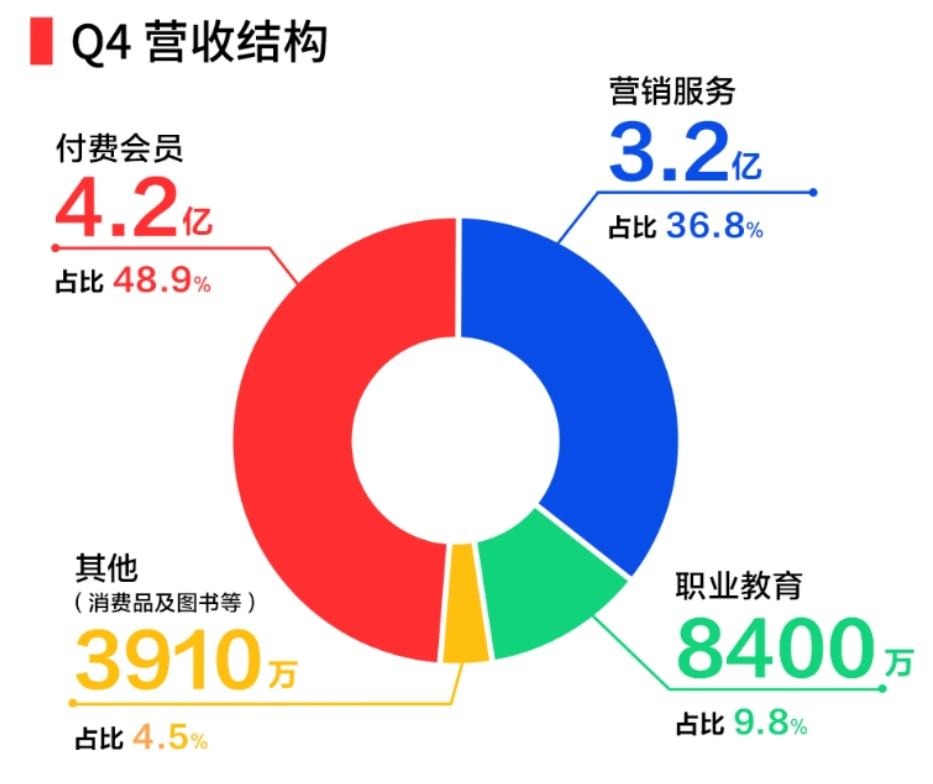Zhihu Achieves Profitability Milestone but Shifts Focus Beyond Profits
![]() 04/03 2025
04/03 2025
![]() 493
493

Four years after its IPO, Zhihu finally posted quarterly profit in the fourth quarter of 2024, a victory achieved through stringent cost-saving measures.
In 2024, Zhihu's annual revenue reached 3.6 billion yuan, with fourth-quarter revenue totaling 860 million yuan and a net profit of 86.4 million yuan. In contrast, the same period last year saw a net loss of 103.1 million yuan. Adjusted net profit stood at 97.1 million yuan, and adjusted operating profit was 23.1 million yuan, both surpassing market expectations.
In terms of revenue composition, paid membership contributed nearly half of the revenue at 420 million yuan, accounting for 48.9%. Marketing services and vocational education generated revenues of 320 million yuan and 84 million yuan, respectively, representing 36.8% and 9.8% of the total.
CFO Wang Han attributed the quarterly profit to "improved operational efficiency and strict cost management." In Q4, Zhihu's revenue costs decreased by 31.5% year-on-year, and expenses fell by 37.9% year-on-year. Costs related to content, operations, marketing, R&D, and personnel were significantly reduced, leading to these impressive results. However, the focus now shifts to whether Zhihu can sustain its growth trajectory post-profitability and stabilize morale.
Addressing the question of "how to sustain growth," AI has emerged as a major strategic bet for Zhihu.
01. Learning Takes a Backseat to "Slacking Off"
Zhihu ventured into vocational education early, launching the online vocational education platform "Zhixuetang" at the end of December 2022. Following the acquisition of an independent brand and platform, Zhixuetang commenced formal independent operation in January last year.
This business aligns well with Zhihu's platform ethos, with "new professionals" becoming a new user definition for a time. At the "2024 Zhihu Education Conference" in January last year, Zhou Yuan described vocational education as completing "the other half" of Zhihu, forming a "complete entity." Post-independent operation, Zhixuetang integrated six sub-brands, covering over 30 sub-categories in six major areas including postgraduate entrance exams, legal exams, civil service exams, and IT office skills.

Source: Internet
However, from the revenue structure, vocational education is still far from becoming a mainstay. In Q4, vocational education revenue was 84 million yuan, accounting for 9.8%, compared to 169 million yuan in the same period last year.
Zhihu's advantage lies in its community ecosystem endorsing course quality and platform traffic driving engagement. However, in niche verticals like civil service and postgraduate entrance exams, established players like Offcn and Fenbi dominate. In terms of professionalism, Zhihu has yet to establish a significant gap.
Nonetheless, over the past year, Zhixuetang has launched many innovative courses, such as AI applications and Xiaohongshu monetization, to differentiate itself in terms of course richness.
But in reality, when choosing between self-improvement and entertainment, most consumers are "hypocritical."
In the fourth quarter, revenue from paid membership was 420 million yuan, down from 456 million yuan in the same period last year, but still accounting for nearly half of total revenue.
The mainstay supporting this revenue, "Yanyan Stories," traces back to the content platform catering to consumers' pursuit of short-form content (though missing out on the short video opportunity). Looking ahead, the IP library provided by short online novels can align with the current trend of short dramas, exploring more possibilities for IP development.
On the "2024 Short Story Influence List" led by Zhihu in December last year, the award settings included the conventional "Most Popular" and "Best Creativity," as well as multiple content subdivisions such as "Salt Selection Thriller," "Salt Selection Heartbreaking Story," "Salt Selection Sweet Story," and "Salt Selection Worldly Wisdom," with "hit-oriented" selection criteria.
Among the winners, thriller representatives like "Layoffs to the Sugar Daddy" and "One Sword Breaking the Sky," and heartbreaking story representatives like "The Female Supporting Character Wants to Die" and "Expired Affection" are densely packed with trending topics and internet-savvy elements, seamlessly connecting with the development of short dramas with the same IP. In fact, Zhihu did have notable cases of IP-adapted short dramas like "Writing Pen" last year.
However, paid reading faces challenges such as a low ARPU value that relies heavily on scale effects, requiring the platform to continuously expand its user base and increase activity levels. Additionally, the homogenization of online novel production is an industry-wide issue, and in the fierce competition for endless creation, it must also contend with purely free platforms.
Furthermore, quick and entertaining content is hard-pressed to carry the future aspirations of Zhihu, a content community founded on professionalism and intellectualism. This makes AI a promising natural choice.
02. How Much Can AI Elevate Zhihu's Potential?
CEO Zhou Yuan addressed a pointed question at this quarter's earnings meeting: whether large language models would replace Zhihu. Zhou Yuan's perspective can be summarized as AI being an opportunity for Zhihu to "ride the wind to the clouds," as Zhihu's expert network can address the issue of trustworthiness in the AI era, and AI will amplify the value of top experts.
This question happens to reveal some of the peculiarities of AI to Zhihu.
First, Zhihu's expert network, or its consistently emphasized professional genes, are embedded in its user structure, content production model, and community culture.
The "stereotypical" Zhihu user is a "new professional" with a high level of education and income, dedicated to self-improvement. They produce professional content based on unique insights and in-depth discussions. These PUGC outputs further cultivate a professional and rational community atmosphere.
The impact of AI on such communities is twofold: on one hand, it can enhance content production efficiency and streamline various processes from content creation to dissemination; on the other hand, it may deconstruct the value of professional producers. A simple hypothesis is that when AI products can answer questions across various professional fields, how can the uniqueness of content produced by Zhihu's top contributors be guaranteed.
Therefore, for this wave of AIGC, whether to "ride the wave" or "go against the tide" hinges entirely on the current choice or decision-making direction.
Currently, Zhihu's designed integration logic is that the content illusion created by AI precisely requires the "gatekeeping" of professional content creators, thereby allowing cutting-edge technology to exert greater value in collaboration with humans. The product primarily embodying this strategic vision is Zhihu Direct Answer.
In terms of functional design, this product is akin to many AI search tools on the market, supporting multiple data sources and providing a knowledge base function to facilitate users' centralized management and information integration. In February this year, it also integrated the "full-blooded" DeepSeek-R1 like many other Internet AI products to improve generation quality.

What sets it apart from competitors is the "traceability function," embodying the value of the "expert network." Supporting direct traceability of search results to the real creations of Zhihu answerers can be seen as leveraging the AI search entry to drive traffic to the community. As previously analyzed by Xinlichang, Zhihu Direct Answer is more like a community "activation" tool, using technology to connect the community with front-end users, ultimately driven by creators and content.
According to the financial report, as of March this year, user activity on Zhihu Direct Answer has reached tens of millions. At the earnings meeting, regarding the direction of continued AI and community integration, one focus is that Direct Answer will have a new version to strengthen the connection between AI and the community; the other is empowering more community workflows with AI to improve efficiency.
In summary, the significance of AI to Zhihu is not disruption but leveraging its attention and "authority" as a cutting-edge technology to make the public re-evaluate Zhihu's long-overlooked professional value.
03. Final Thoughts
Zhihu exhibits a paradoxical clarity in its strategic choices, aiming to maintain the dignity of the platform as the "high ground of professional content" on the Chinese internet while relying on Yanyan Stories to support half of its revenue with thrilling novels. It emphasizes the irreplaceability of the expert network in the era of large models while appropriating individual creations as AI corpus in the Direct Answer product.
What is intriguing is the subtle shift in the capital market's patience with Zhihu. As investors begin to re-evaluate the company using the standards of "AI concept stocks," Zhihu may have realized that, compared to profit figures, convincing the market that Zhihu can break through the value constraints of knowledge communities is the real test.
This moment of profit news not only validates the company's survival ability through stringent cost-saving measures but also hints that breakthrough growth will not happen overnight. As the focus of competition in the second half of the internet shifts to AI-native applications and ecological reconstruction, this fledgling profit-maker is boarding a bus that redefines the rules of the game.
*The title image and images in the text are sourced from the internet.








